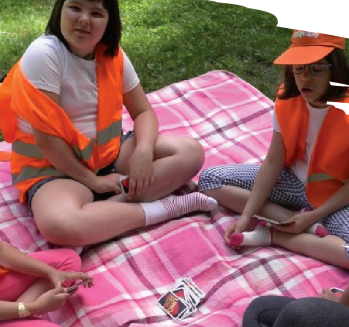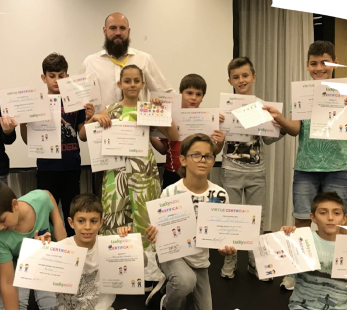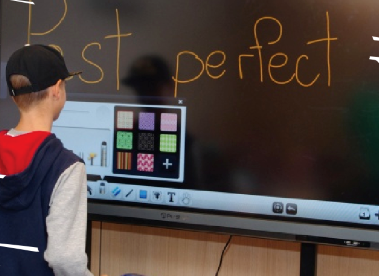Forms of education for beginners – testing, methods and methodologies, lesson content
In most cases children at the age of 5 to 6,99 would fall into the beginners level. Very rarely, there are older children who do not speak the language.
Testing for beginner children is executed in a very simple manner, since a more complex one is not necessary. Children would complete a picture test, then would draw and play games, during which teachers organize simple conversations to gain an idea of the extent to which the children speak the language and the extent to which they feel comfortable in an English speaking environment. On this basis, they would determine the approach and the educational method to be applied in the respective group.
Beginner groups in LuckyKids are divided into two types: beginner children of school age who can read and write and beginner children in pre-school age who cannot read and write.
Children who cannot read and write

Several systems are applied when working with them, as the English lessons are as easy to understand and simple as possible. All classes take place in the form of a game.
Methodologies such as: Play and Talk with Echo, Jolly Phonics, KidSparks materials and others are used as a basis.
During the first few days, children would learn basic words and phrases to help them during their stay in the camp, which are related to the program’s direct activities: I need help, I need to go to the bathroom, I am hungry, I am thirsty, it is time to go to bed, it is time to get up, I have a headache, I have a stomachache, what is the time, where are we going, horseback riding, cycling, hiking in the mountains, etc.
The next few days are related to virtues and their application: use of “magic words,” how to get help or receive help, what virtues mean and what “they serve for”.
An obligatory part of the English education of the youngsters is the part of conversations about the day: what it is going to be like (as regards the camp program), what is the weather, what day of the week is it today, what day of the calendar is it today, talks about the seasons, how to dress appropriately?
All these themes help children to orient themselves in time and space in a foreign language environment and provide them with more comfort during their stay.
The next stage in beginner children is related to working on the projects set up by the specific theme of the camp shift.
The written materials are related to picture puzzles, connecting points, connecting a letter with a specific object, repeating broken lines, etc.

A prerequisite for teaching younger children is the use of many audio-visual examples, engaging in role-playing games, performing many songs and dancing – all of these approaches are laid down in the modern teaching methods in early foreign language education such as Suggestopedia, Montessori, Solar Pedagogy, Waldorf pedagogy and others.
As with more advanced groups, each teacher chooses the approach according to the dynamics of the current group.
Note: Pre-school children who cannot read and write, but who speak fluent English at a high level also fall into the beginners group. Because of their fragile age, they are unable to cope with higher levels. Although they have excellent spoken language, they further advance in class because they increase both their passive and their active vocabulary and gain new knowledge in a variety of areas of life.
Children who can read and write
Written work in these children differs from the upper age group. They spend more time writing phrases and sentences in English related to the daily life at the camp or the project theme. Quite often, children in school age will be able to write half-page short stories at the end of the period.

Note: LuckyKids follows the UK educational requirements for English language education. According to them, children in the second grade – 8 years of age, are rarely corrected for the proper spelling of words. The so-called “Spelling” is taught in the second grade and until then children would spell what they hear and write the letters at their discretion.
Such a solution is necessary due to the fact that in the English language what we write is quite different from what we pronounce (unlike the Bulgarian language where there is no such case).
In LuckyKids, the children learn about the basic pronunciations of the letters, the vowels and the consonants in the English language, the basic tenses, verb conjugation such as “be” and “have”. When writing short stories and explanatory sentences in their projects, children would often have the freedom to write the words “wrong” – in the beginner group such spelling is not considered a mistake.
Other major themes that concern the beginner group are: “Fruits and Vegetables”, “Vehicles”, “Animals in the Forest, Farm, Jungle, Sea”, “My Home Town”, “My Family”, and more.
Most topics come from the areas of the Social and Natural world – main areas of pre-school education. They provide a solid foundation for the English language and make it easier for children to apply in the future.
Particularly important for all children at the beginner level is their general condition and adaptation at the camp. At such an early age, every child needs to be approached individually. Some of the children have a language problem, others find it difficult to interact with adult strangers, third with peer strangers, fourth with separation from the family environment, and so on.
All these factors should be taken into account, especially when visiting the camp for the first time. The camp requires that children from 5 to 7 years of age are accompanied due to the above reasons. The presence of a family member with them at the camp guarantees greater comfort and easier adaptation.
After 7 years of age, LuckyKids allows each parent to decide whether their child needs further assistance with adaptation at the camp.
Proper discretion is of great importance for the end result and success in learning the English language.
From June 20 to September 5
Teachers with native English
4 hours of interactive English language instruction
